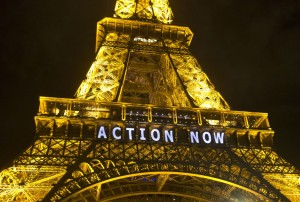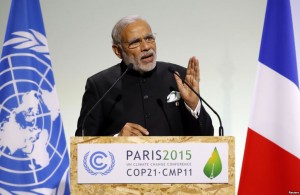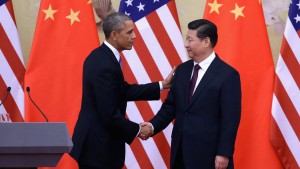 Last weekend, leaders from 196 countries approved the first global agreement aimed at limiting greenhouse gas emissions, a milestone in human history. President Obama has been considered a deciding figure in the agreement, as Obama’s climate change agenda has been hidden within the administration’s actions since the president’s first month in office. Now suddenly, we are seeing the fruits of that labor, which have been taking place for some time without any fanfare. The climate change agreement is without a doubt a triumph of international diplomacy, and proof that leaders from different countries around the world can come together for a common cause, something that will greatly affect future generations, long after everyone alive today has turned to dust. Some are calling this the Obama administration’s most important accomplishment, and it doesn’t matter what side of the isle you’re on, the agreement is a tremendous achievement, not only for the president but for human kind.
Last weekend, leaders from 196 countries approved the first global agreement aimed at limiting greenhouse gas emissions, a milestone in human history. President Obama has been considered a deciding figure in the agreement, as Obama’s climate change agenda has been hidden within the administration’s actions since the president’s first month in office. Now suddenly, we are seeing the fruits of that labor, which have been taking place for some time without any fanfare. The climate change agreement is without a doubt a triumph of international diplomacy, and proof that leaders from different countries around the world can come together for a common cause, something that will greatly affect future generations, long after everyone alive today has turned to dust. Some are calling this the Obama administration’s most important accomplishment, and it doesn’t matter what side of the isle you’re on, the agreement is a tremendous achievement, not only for the president but for human kind.

The Eiffel Tower lights up with the slogan”Action Now”referring to the COP21, United Nations Climate Change Conference in Paris, Sunday, Dec. 6, 2015. Negotiators adopted a draft climate agreement Saturday that was cluttered with brackets and competing options, leaving ministers with the job of untangling key sticking points in what is envisioned to become a lasting, universal pact to fight global warming. (AP Photo/Michel Euler)
Observations about the agreement:
- In pitching the scenario to the international community, the Obama administration made several key observations. First, climate change is an issue like no other. This isn’t something that can be fixed with a legislative session, or executive order. The damage from climate change is irreversible. Melted glaciers cannot easily be re-frozen, and rising sea levels cannot be easily dropped. Extinct species may be impossible to resurrect and flooded coastal cities are likely gone forever. Most scientists agree that if we don’t act now to limit greenhouse gas emissions, the scale will tip and humanities’ only option will be constant damage control and eventually a planet that is no longer suitable for mankind.
- Also, it was in 1990 that the Intergovernmental Panel on Climate Change called for a global treaty to limit the effects of greenhouse gas. For the last quarter of a century the United Nations has failed to organize effective world action. Even in the face of deadly and dire warnings that our actions were having a grave impact on the planet, the international community has avoided coming together on an agreement. Many climate summits that involved world leaders have been chalked up to wastes of time, where back door meetings resulted in energy contracts, when they were intended to result in climate pacts.
- Obama started the push toward an international agreement with a 90-billion-dollar investment in green-energy financing. Giving companies and researchers the capital they needed to implement new technologies for alternative power. Obama actually signed the green-stimulus package during his first month in the oval office with hope that it would inspire international cap and trade laws at the Copenhagen summit in 2009. Though in 2009, negotiations in Copenhagen collapsed and cap and trade laws were blocked by both a coalition of democrats from fossil fuel producing states, and the entirety of the Republican Party.
- Obama used his authority under the Clean Air Act to devise innovative new greenhouse gas emission regulations across the economic spectrum. This gave the administration the leverage needed to negotiate a bi-lateral agreement with China in 2014, breaking down a stalemate between the industrialized west and developing nations that had crumbled previous negotiations. In addition, Obama’s 2008 green-stimulus package had plummeted the cost of alternative power solutions like solar and wind. Now more than ever dedication to alternative energy is economically viable and feasible.
- Climate change action is especially difficult in the United States, as the front-end costs are high, both for the government and for average Americans. To make matters worse the benefits are far off in the distant future, in some cases long after most of us alive on the planet today are dead and buried. Since the U.S. has the unusual governing practice of allowing the legislative and executive branches to be controlled by different parties, it can be especially difficult to bring law makers together on such an expensive long-term goal. For average Americans, it’s hard for them to understand how sacrifice today will yield a better tomorrow when they know it’s unlikely they will see it. To make matters much worse, the United States is the only country in the democratic world that has a major political party that questions the scientific validity of climate change’s anthropogenic causes. In many cases leaders from the Republican Party embrace conspiracy theories and pseudoscience to explain natural origins to Earth’s rapidly changing climate. This type of argument isn’t heard anywhere else in the democratically controlled world. The Paris agreement had to work around this serious, and almost impenetrable obstacle.
 While the agreement in Paris is promising, now begins the hard work. It’s obvious that greenhouse gas emission reductions are unlikely to take place unless they are economically feasible. Furthermore, there were some serious greenhouse gas contributions seemingly absent from the Paris negotiations. Some have questioned how effective the agreement can truly be, without acknowledging these important climate change contributors.
While the agreement in Paris is promising, now begins the hard work. It’s obvious that greenhouse gas emission reductions are unlikely to take place unless they are economically feasible. Furthermore, there were some serious greenhouse gas contributions seemingly absent from the Paris negotiations. Some have questioned how effective the agreement can truly be, without acknowledging these important climate change contributors.
- The impact of industrialized fishing on bio-diversity depletion over the world’s oceans was not even discussed at the Paris summit. The loss of over 40% of phytoplankton within the oceans was also not discussed, even though phytoplankton accounts for over 80% of the oxygen human beings breathe. A simple solution would be to stop international government subsidiaries for industrialized fishing, accounting for about 76 billion Euros annually. Nothing about wide reaching coral bleaching events, ocean acidification, the loss of coral reefs worldwide and plastic debris flooding the oceans was discussed. That said, it’s unlikely the resolution will result in anything that helps protect oceanic ecosystems and bio-diversity. The fact that industrialized fishing is strip-mining the ocean of important and delicate species was ignored entirely.
- The impact of animal based agriculture was not discussed at the summit. The animal based agriculture industry accounts for more greenhouse gas emissions yearly then the entire transportation industry. The reality is that a vegan driving a Hummer would result in less CO2 emissions then a meat eater that rides a bike. The only mention of the animal agriculture industry and industrialized fishing industries contribution to greenhouse gases were the hamburger and fish stands at the summit, which provided food for the meeting nations.
- The massive destruction of the Amazon rain forest along with other rainforest ecosystems worldwide, along with the plight of various indigenous people (often the first to be effected by climate change) was not acknowledged or discussed. Amazon rain forest destruction leads directly to ocean sedimentation and other serious environmental stressors, yet this important issue was absent at the discussions and omitted from any agreement.
- The escalating human population, and its effect on finite natural resources was not discussed. There is nothing in the agreement to address or fund ideas that can help lessen the impact of the massive human population upon the planet.
 Even more upsetting is that nothing in the agreement binds the nations to any proposed actions. The proof will lie in the doing, not the talking about potential actions. Hopefully as time moves along we will learn that the French saying, “Cet accord est juste un conte fees” (This accord is just a fairy tale) is false, and that nations are putting forth strong effort to curb greenhouse gas emissions, and decrease the human effect on Earth’s changing climate. Though as the old saying goes, the proof is in the pudding. While it’s important to recognize the achievement on the part of the Obama administration and international community, for now we can only hope that the nations involved hold up to their commitment, and that perhaps in the near future other serious environmental stressors are included in international discussions, and actions.
Even more upsetting is that nothing in the agreement binds the nations to any proposed actions. The proof will lie in the doing, not the talking about potential actions. Hopefully as time moves along we will learn that the French saying, “Cet accord est juste un conte fees” (This accord is just a fairy tale) is false, and that nations are putting forth strong effort to curb greenhouse gas emissions, and decrease the human effect on Earth’s changing climate. Though as the old saying goes, the proof is in the pudding. While it’s important to recognize the achievement on the part of the Obama administration and international community, for now we can only hope that the nations involved hold up to their commitment, and that perhaps in the near future other serious environmental stressors are included in international discussions, and actions.











0 Comments